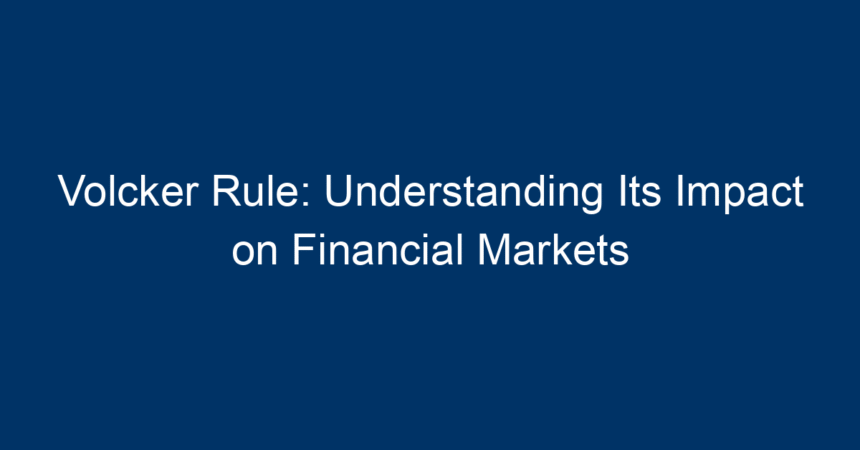In the wake of the 2008 financial crisis, regulatory measures have become pivotal in ensuring the stability of global financial systems. One of the most significant reforms introduced was the Volcker Rule. Named after former Federal Reserve Chairman Paul Volcker, the rule aimed to mitigate excessive risk-taking by financial institutions through a prohibition of proprietary trading and certain investments. But what exactly is the Volcker Rule, and how does it affect financial markets? This article delves deep into its implications, providing a comprehensive understanding of its role and how it shapes the landscape of finance today.
What is the Volcker Rule?
The Volcker Rule was implemented as part of the Dodd-Frank Wall Street Reform and Consumer Protection Act of 2010. Its primary objective is to prevent banks from engaging in risky investment practices that contributed to the financial meltdown. The rule specifically restricts banks from conducting proprietary trading—trading financial instruments for their own profit rather than on behalf of customers.
Key Components of the Volcker Rule
-
Proprietary Trading Prohibition: Banks are barred from engaging in speculative trading with their own capital. This measure aims to ensure that banks conduct their business with a focus on customer needs rather than chasing high-risk profits.
-
Investment in Hedge Funds and Private Equity: The rule also limits the amount that banks can invest in hedge funds and private equity funds, capping investments at no more than 3% of their Tier 1 capital. This provides an additional layer of risk management.
- Compliance Requirements: Banks must establish robust compliance measures to monitor and adhere to the Volcker Rule’s provisions. The Financial Stability Oversight Council (FSOC) and other regulatory bodies oversee enforcement.
The Impact on Financial Institutions
The Volcker Rule has had profound implications for the operations of financial institutions. Its effects can be categorized into several areas:
1. Reduced Risk-Taking
One of the most significant impacts of the Volcker Rule has been the reduction in risk-taking by banks. With proprietary trading prohibited, banks have shifted their focus away from speculative activities towards more stable income sources. This has lead to a more conservative approach in portfolio management and investment strategies.
2. Changes in Revenue Streams
The Volcker Rule has forced banks to reassess their revenue sources. With limitations on trading profits, banks have had to rely more on traditional banking activities, such as lending and deposit-taking, to generate income. This shift has also prompted banks to innovate and enhance their client service offerings.
3. Challenges for Smaller Banks
While large financial institutions are better equipped to absorb the implications of the Volcker Rule, smaller banks may face challenges. Their limited resources and expertise can make compliance difficult, potentially stifling their growth and competitive edge. This raises concerns about market concentration and reduces overall competition in the banking industry.
Effects on Financial Markets
The Volcker Rule has significantly influenced the dynamics of financial markets in various ways.
1. Volatility in Trading
Before the implementation of the Volcker Rule, proprietary trading contributed to significant market volatility. The ban on speculative trading has, in theory, contributed to a more stable financial environment. However, it has also led to decreased liquidity in certain markets, particularly during times of financial stress.
2. Impact on Investment Strategies
The Volcker Rule has prompted investors to rethink their strategies. Hedge funds and private equity firms now face more scrutiny from banks that may limit their investments. Consequently, this has changed the risk-return profile for many investment strategies, pushing investors towards more conventional investment vehicles.
3. Regulatory Environment and Compliance Costs
Maintaining compliance with the Volcker Rule has increased operational costs for financial institutions. Banks are investing heavily in technology and human resources to monitor their trading activities effectively. This has led to a broader regulatory environment, pushing banks to allocate resources towards compliance rather than innovation.
Criticisms and Limitations of the Volcker Rule
While the Volcker Rule has brought several benefits, it is not without its criticisms.
1. Restrictions on Market Efficiency
Critics argue that the Volcker Rule may hinder market efficiency by limiting the ability of banks to provide liquidity. Proprietary trading often facilitates smoother market operations, and its absence may lead to inefficiencies in price discovery processes.
2. Regulatory Arbitrage
There are concerns that financial institutions may seek opportunities to circumvent the Volcker Rule through regulatory arbitrage. This could lead to the emergence of shadow banking systems that operate outside the purview of formal regulations, potentially creating new risks.
3. Limited Effectiveness during Crises
Some experts contend that while the Volcker Rule aims to curb risk-taking, it may not be sufficient during financial crises. Markets can behave irrationally, and restrictions may fail to prevent systemic risk proliferation.
The Future of the Volcker Rule
Looking forward, the Volcker Rule is likely to evolve. Regulatory bodies may adjust its provisions in response to changing market dynamics and emerging risks. Continuous dialogue among stakeholders—regulators, financial institutions, and investors—will be crucial for refining the rule.
Possible Revisions
-
Adjustments in Compliance Requirements: Streamlining compliance processes could ease the burdens on financial institutions, especially smaller banks. Increased flexibility in applying the rule might foster a more competitive banking environment.
-
Review of Investment Limits: Re-evaluating investment limits in hedge funds and private equity could enhance banks’ ability to engage in profitable activities while balancing risk.
- Integrating Technology: Regulatory bodies may leverage technology for more efficient monitoring and compliance processes. This could lower operational costs and make it easier for financial institutions to comply without compromising profitability.
Conclusion: Embracing the Volcker Rule
The Volcker Rule has undoubtedly shaped the financial landscape, promoting stability while mitigating the risks that led to the 2008 crisis. While it presents challenges and criticisms, its fundamental goal of ensuring a more responsible banking environment remains relevant.
Actionable Insights
-
For Financial Institutions: Invest in compliance technology to streamline adherence to the Volcker Rule. Adapt and innovate your business model to thrive under these regulations.
-
For Investors: Understand the implications of the Volcker Rule when developing investment strategies. Consider diversifying your portfolio to incorporate more traditional investment vehicles.
- For Regulators: Engage with industry stakeholders to refine the Volcker Rule, ensuring it evolves with market changes while maintaining its core objectives.
In this ever-evolving financial landscape, understanding and adapting to the Volcker Rule is essential for stability, growth, and innovation.




